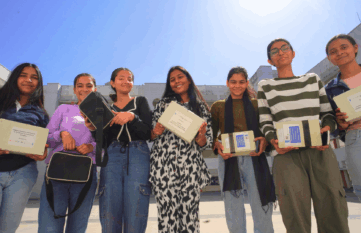The topic of artificial intelligence is developing rapidly – there isn’t a newspaper or news portal that doesn’t deal with the topic several times a day. How confident are you that this dynamic process can be shaped at all, aren’t we inevitably always lagging behind?
Artificial intelligence is indeed evolving at a rapid pace, and it’s true that the speed of change can sometimes make it feel like we’re constantly playing catch-up. However, I remain confident that if we have the will to do so, we can shape this technology in ways that benefit everyone.
The recent Summit of the Future is a clear testament to what can be achieved when global actors come together. On 22 September, world leaders adopted the Pact for the Future to adapt international cooperation to the realities of today and the challenges of tomorrow. By laying out a global roadmap for cooperation, the Pact underscores the importance of shaping technological progress to meet global needs. The same approach is reflected in the Global Digital Compact (one of the Pact’s Annexes), which lays out concrete actions for harnessing digital technologies, including AI, and closing digital divides.
These global initiatives remind us that while we may not always control the speed of innovation, we do have the power — and the responsibility — to steer its direction. More importantly, we need to ensure that the Global South remains central to these efforts. This requires prioritizing investments to support developing countries build the foundational elements needed to fully leverage AI – including data, computing power and skilled talent.
Artificial Intelligence for human development? I’m sure some people will be puzzled by this at first. So, what significance does this technology have for international cooperation and specifically for the work of UNDP?
Artificial Intelligence can accelerate human development by addressing complex challenges — from improving healthcare outcomes and mitigating climate change to promoting inclusive governance. However, for AI to be a true catalyst for global development, it must be inclusive, equitable, and governed responsibly. International cooperation is key here. No single country or organization can fully realize the benefits of AI alone, especially when the goal is to create solutions that work for everyone, not just the most technologically advanced. It is especially important to prioritize those most at risk of being left behind.
For the UN Development Programme (UNDP) this means supporting our partner governments – most of whom are in the Global South – in crafting national AI strategies, fostering AI literacy among policymakers, and developing the necessary regulatory frameworks that ensure AI is used ethically and safely. We also support educational institutions in the development of AI curricula and work with the private sector to promote local AI talent. As part of our cooperation with the Italian G7 presidency, for example, we have launched the AI Hub for Sustainable Development, which focuses on key sectors such as energy, agriculture, health, water, education and infrastructure in cooperation with African countries in order to utilise the transformative potential of AI.
What risks do you see in the use of AI for our partner countries and how can the global community effectively address these challenges without foreclosing the potential?
Before we can fully harness the benefits of AI, it’s critical to recognize the disparities in access to AI resources and infrastructure. The Global South lacks access to compute capacity for AI, and less than two per cent of the world’s data centres are located in Africa. In addition, most AI training data is sourced from the Global North, leaving many regions in the Global South underrepresented, especially when it comes to local languages and contexts. Many developing countries also lack comprehensive AI strategies, policies, and governance frameworks, which are needed to create an environment conducive to responsible AI innovation and adoption. The Global South consistently lags in AI skills readiness with a notable shortage of researchers and practitioners, exacerbating the gap. Furthermore, bias within AI systems remains a persistent challenge, often amplifying inequalities.
These inequities in AI readiness inevitably spill over into critical areas such as AI safety and ethical use on a global scale. To mitigate these risks, we must focus on building local capacity and infrastructure in our partner countries. This involves investing in digital literacy, creating robust regulatory frameworks, and ensuring inclusive data governance. Importantly, democratizing access to AI and data is essential to ensure that AI serves as a tool for development rather than a source of new disparities.
The Hamburg Sustainability Conference should pave the way for a “Hamburg Declaration on Responsible AI”, an official declaration to be adopted in 2025. The goal is a responsible use of AI that puts people first and benefits everyone equally. How can we achieve these goals and what role do you see for UNDP?
What is urgently required is a concerted, multi-stakeholder approach that prioritizes human well-being, equity and sustainability. At the inaugural edition of the Hamburg Sustainability Conference (HSC), through candid multistakeholder dialogues, we hope to lay the groundwork for the Hamburg Declaration by establishing overarching principles for leveraging responsible AI for sustainable development. These principles centred around five pillars – people, planet, prosperity, peace and partnerships – will drive the vision for collective global action.
I see UNDP’s role in helping address the existing disparities in AI resources, access and talent. Without bridging these gaps, AI will continue to benefit a select few while leaving many behind. Second, ensuring equitable access to AI technology is fundamental. For AI to benefit everyone, we must mobilize resources to enhance AI readiness in developing countries by investing in infrastructure, policies, and regulatory frameworks that promote responsible AI innovation.
At the same time, this approach must be underpinned by a firm commitment to shared principles, global governance standards and inclusive governance frameworks. AI systems must be transparent, accountable, and designed to uphold human rights. Our work at the HSC can set the tone by outlining clear guidelines that prioritize fairness, reduce biases, and protect against potential harms and chart the path forward for leveraging AI solutions for sustainable development.
In your opinion, what is the role of the private sector and civil society in implementing the Hamburg Declaration and what contribution can both make to ensure the responsible design of AI?
The private sector and civil society both have critical roles to play in bringing the Declaration’s principles to life. The private sector, as the primary engine of AI innovation, holds significant responsibility in ensuring that AI technologies are designed and deployed in ways that align with sustainable development and human rights. Companies have a unique ability to embed ethical standards directly into the design and development cycle — whether it’s through responsible data management practices, transparent algorithm design, or fair AI governance frameworks.
Civil society, on the other hand, plays an equally important role as both advocates for people and a source of expertise. Civil society organizations (CSOs) can monitor AI developments and their impacts on vulnerable communities, raising the alarm when technologies threaten to exacerbate inequalities or violate human rights.
Another key stakeholder that deserves more prominence in this conversation is youth. For instance, Africa has the youngest population in the world, with 70 per cent of sub-Saharan Africa under the age of 30. Youth-driven innovation is vital to sustainable development, and young people have a unique capacity to leverage AI to address real-world challenges. Youth need not only to be part of the AI community but also to have a voice in decision-making at all levels, ensuring that AI development reflects the needs and aspirations of future generations.



